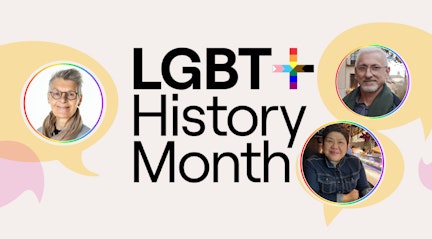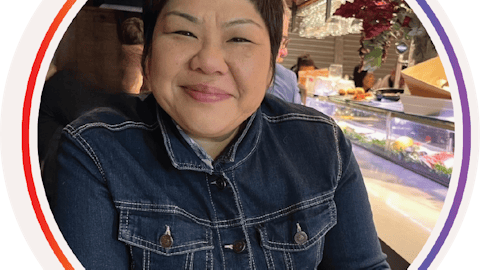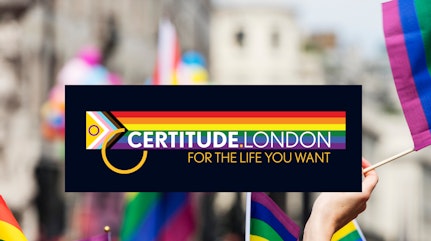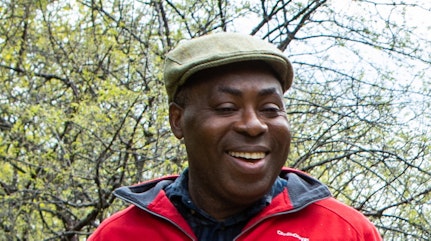Claiming our past, celebrating our present and creating our future
-
Blogs

This LGBTQ+ History month we asked colleagues from across our organisation to share their coming out stories.
These stories reflect on the past, the present and the future, and express the author's thoughts and feelings about diversity, inclusion and belonging.

Professor Sally Glen
Chair of the Quality, Performance & Compliance Committee, Vice Chair of the Southside Partnership Board
I grew up in what was a small town in the Home Counties. It was in the sixties when there were three channels on the TV. There was of course no internet or social media. In retrospect I think I had a vague awareness of two or three individuals who may have been gay and lesbian, but I certainly did not have a vocabulary for being “gay” or “lesbian”, let alone the understanding you could live a happy and fulfilling life as a gay man or lesbian woman.
In the early seventies I moved to London to study. It corresponded with the first wave of feminism. I met for the first-time women who identified as lesbian who often dressed in a stereotypical “butch” way. I would not have thought it possible at that time that we would now have gay marriage and visible, high-profile members from the LGBTQIA community across all walks of life.
I do not think I have ever “come out” as such. In the seventies and eighties, I dressed in a stereotypical way and let everyone draw their own conclusion. Maybe I was a coward. Although I tend to take the view that the hardest part is acknowledging one’s own sexuality if it does not conform to other people’s expectations.
During the eighties I experienced being shouted at in the street and verbally abused outside a supermarket in central London surrounded by passersby. This would now be classed as “hate crime”. Even today, members of the LGBTQIA community are still subject to verbal and physical abuse.
What I reflect on now is that the lesbians of the 1970s are likely, now, and in the near future, to be patients on NHS Care of the Elderly wards, care home residents and social care clients. Many of us have led fulfilled and happy lives, have married and had children.
I am not sure that those services are ready for this demographic group who now expect equality and inclusion, and therefore that their families and relationships are acknowledged.

May Lee
Practice Improvement Lead - Chair of Pride at Certitude
When I was first asked to ‘write a blog about your coming out story’, my first thought was, ‘which one?!’. I have a few ‘big coming out stories’ and many, many smaller, everyday ones. That’s because if you are LGBTQ+, ‘coming out’ is something that you have to do throughout your life, not just once.
It’s whenever you meet new people who make assumptions about you and your life - which means that you have to make a split decision about whether or not to correct them.
It’s the countless times I’m out with my wife and we get referred to as ‘friends’ because the receptionist, or storekeeper, or whoever can’t imagine we’d be anything else – but they'd always assume a man and woman in the same situation are a couple.
Like many people, in my younger days coming out was about the worry of not being accepted, the guilt of not feeling honest, the dread of being rejected by people I loved. Luckily, everything’s worked out well for me over the years and everyone wholeheartedly accepted me as I am. In fact, none of them were very surprised and some of my ‘big coming out’ conversations turned out to be much smaller than I expected!
‘Coming out’ can be a ground shaking, life changing experience, or a small minor everyday thing. So I prefer to say that I “started coming out within the first couple of months at University”, as it’s an activity that I don’t think I’ll ever finish.
My first ‘proper’ coming out conversation was when I was 18 and in a car with three other women, coming back from a lecture in another town. We’d only just met and didn’t know each other at all. One of them asked me about something – I can’t remember exactly what.
But I do remember my answer, which was, “I’m a lesbian”.
It was the first time I’d said it out loud and it felt very scary, but in a good way.
The car fell silent for a few seconds, and the woman I was speaking to answered, “So am I”. Then the second woman said, ‘Me too’ and then the third said the same!
That memory makes me smile even now, well over 30 years later.

Juan Gallego
Registered Manager
I come from a big traditional Spanish family, yet quite open minded in many ways. Spain was experiencing dramatic changes in society, values, and attitudes following the death of Franco. However, I grew up seeing negative stereotypes of gay men on TV, movies, in the comments of teachers etc. Since an early age my parents could see that I was ‘special’ and with their best intentions they thought that they had to ‘correct’ me by not allowing me to do ‘girly things’ such as drawing princesses, fairies with lovely clothes and hairstyles, etc. They allowed me to draw landscapes, animals, and nativities, so I kept on drawing Virgin Mary, but with full make up, fashionable hair styles and very low necklines). No need to say, my Mum was horrified to see this! It was not until I started to go to the fashionable mixed clubs in Madrid during the late 1980s (I was about 20) that I had my first gay friends and sexual experiences with men. By this time, we had many positive role models in the cultural scene, music industry, movies, etc., and although I would not disclose my sexuality openly to everyone, I was confident and happy to be who I was. A close friend of mine told my sister’s boyfriend my ‘little secrets’, so soon all my brothers and sisters got to know about me. They were not concerned at all about it, so no drama or difficult conversations.
I moved to London at the age of 22, and almost from the first job I had, I have been out, and I cannot think of negative experiences or rejection from colleagues (sadly, I know that this is not the case for many people). With my parents I was a bit shyer at this age, and although I did not discuss my sexuality, I brought home gay friends, and told my mum about their lives. My parents knew I was living in London with another man, and it was obvious that he was my partner. At some point when I was around 26, I started visiting my parents with my partner, as my siblings did with theirs. Fortunately, they all got on and we spent time in harmony together, and I never felt I was treated differently. I am blessed to have a family who has been ever supportive and able to adapt to situations that were not in line with their upbringing and beliefs. Unfortunately, many people (including some of my friends) have not been so lucky.







